How Masking Kidnapped My Happiness
Recovering the kid I lost by learning to embrace conflict.
I was five when I learned a lesson in dishonesty that I wouldn’t unlearn until my twenties. The sad part is how ordinary and unintentional it was.
I’d spent the night at my dad’s new house. His soon-to-be wife was putting me to bed. When she’d said “I love you,” I didn’t know how to respond. At that point, I barely knew her and I didn’t want to say it back. So I was honest, and even a little blunt, like any five-year-old. And she didn’t respond well.
I know now that she was hurt. But then, I couldn’t figure out why she was mad. Or what I’d done wrong. Scared and in an unfamiliar place, I went looking for my dad. When I found him, he led with anger, too, creating even more confusion for me.
But I did learn something important: emotional honesty doesn’t guarantee your safety.
I’d been honest with my almost-step-mom and it blew up in my face. She’d been vulnerable and I’d rejected it.
Masking is a form of conflict avoidance where you rearrange yourself to pacify others.
Rejection teaches many of us to withhold the vulnerable parts of ourselves. We start hiding behind masks to avoid the hurt that comes with it.
I began masking to protect myself—becoming a chameleon in the process. Although, it really isn’t about trying to hide so much as it’s about trying not to disrupt people.
Vulnerability is what develops empathy. And when it’s rejected, you get masking. That’s when we start concealing parts of ourselves and showing a false exterior to the people around us, instead of our authentic selves. But that’s a big, huge, very sad problem. Because feeling seen is how we build connection.
So… by design, masking sets everyone up to fail.
Masking is inherently deceptive—which is, regrettably, the whole point.
How sad is that?
The safety mechanism we develop out of fear is the exact barrier to getting what we actually want. At their core, everyone wants to feel seen when being vulnerable and to be accepted for who they are when they risk emotional visibility.
Masking feels safe. But in exchange for your safety, it then robs you of the ability to show up authentically. And you don’t even realize it at first. Changing how I presented myself in certain spaces made me feel a bit like a trained actor. Admittedly, I even thought of it like a neat little skill I’d picked up.
Deception aside, the really shitty part of masking is that it actively blocks you from being happy. It’s a habit built on warding off threats to your insecurities. But when you feel like you can’t show up as yourself, resentment starts to build. And then it festers, unaddressed, because you’ve developed the habit of avoiding conflict. In turn, how we deal with conflict is shaped by how we handle insecurity.
Round and round it goes.
Insecurity is the biggest bully most of us will ever face.
Growing up, I loved performing. Acting, singing, playing music… you name it. I was quite the showman until my fear got the best of me. I remember playing the role of Willy Wonka in my summer camp’s production of Charlie and The Chocolate Factory.
After taking a bow, I’d walked off stage with the rest of the cast. Emerging from backstage, one of the counselors, Ian, who’d been in the audience told me with sincerity that he thought I was phenomenal. He couldn’t have known the impact of his words. I’d secretly wanted to become an actor when I grew up. Jim Carrey’s 1994 movie, The Mask, had contributed to an already palpable love of performing. But not knowing how to take a compliment, I countered Ian with some sort of light hearted, self-deprecating joke.
He tried again. And so did I. We volleyed back and forth a couple of times before he finally sighed. It was laced with a bit of frustration and a sense of knowing. And yet, it remained free of irreverence.
Pausing, he looked at me.
Then, he said, “you have the skill that a lot of them will wish for” pointing toward the younger cast members backstage.
I was a Counselor In Training (CIT), and therefore just slightly older than most of the other campers in the cast. He frowned a bit, then continued, “I’m serious, it seems like your ‘thing.’” Before dropping it and going to chat with the others, he concluded with, “one day, maybe you’ll get it.”
And he was right.
My carefully constructed life started feeling like a disguise I didn’t want to wear anymore.
Maybe your mask didn’t look like mine. I’d bet there’s something you’ve carried for long enough it started to feel awkward while you were outgrowing it.
That was me during my teen years and throughout my twenties. I hadn’t realized how much of my identity was built around avoidance. Finally, frustration boiled over and I found myself wondering what it would be like to live my life without masking.
Things started slowly at first, but gained momentum over time. In the moments where I’d slip, my therapist referred to it as being on my “best behavior.” Or, a version of pretending that’s shy of full, identity-level masking.
Since I’d worked through a lot of that already, the extra awareness was helpful to avoid the “dinner-party distance” that “best behavior” creates.
Taking the mask off was the last step to unblocking my freedom.
I’m still afraid that sharing myself openly will trash my public “credibility.” And at the same time, I’m scared that my insecurities will prevent me from living a happy, fulfilled life. So, I’m leaning into the discomfort of trying to overcome them.
If you’ve never gone back to read your old writing, scroll your old social posts, or any other form of nostalgic deep-dive, I highly recommend it. You’ll probably surprise yourself with your own past-wisdom. Maybe you’ll end up teaching your present self a thing or two.
That’s what happened to me.
I stumbled across some photos from a keynote I used to give on self-acceptance, called “Mission: Permission.” In it, I talk about how underdeveloped coping skills sent me head first into a life-altering mental health crisis. And what an outdoor leadership program taught me about creating a life I loved—one where I was able to facilitate similar transformations for others.
"Hey, your calling’s asking for you again... should I say you're busy?"
Writing has always been what I’ve felt called to do.
I used to help people navigate technical terrain in the mountains. The way I see it, writing’s just a different type of guiding. I like helping people through their own ah-ha moments. If I really think about it… that’s at the core of why I wanted to be an actor, too.
And yet, I’ve consistently kept writing at an arm’s length. That’s another self-preservation technique that trips me up. We keep ourselves safe by getting just close enough to what we want without actually showing up as our authentic selves. That way, nobody can trigger our insecurity. Including, and especially, us.
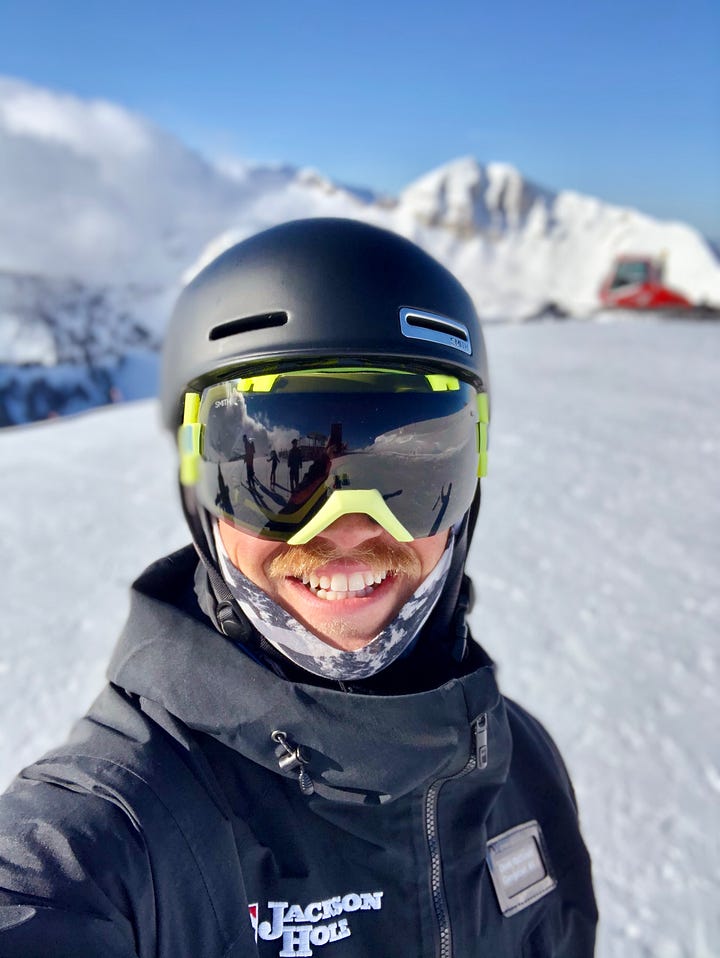
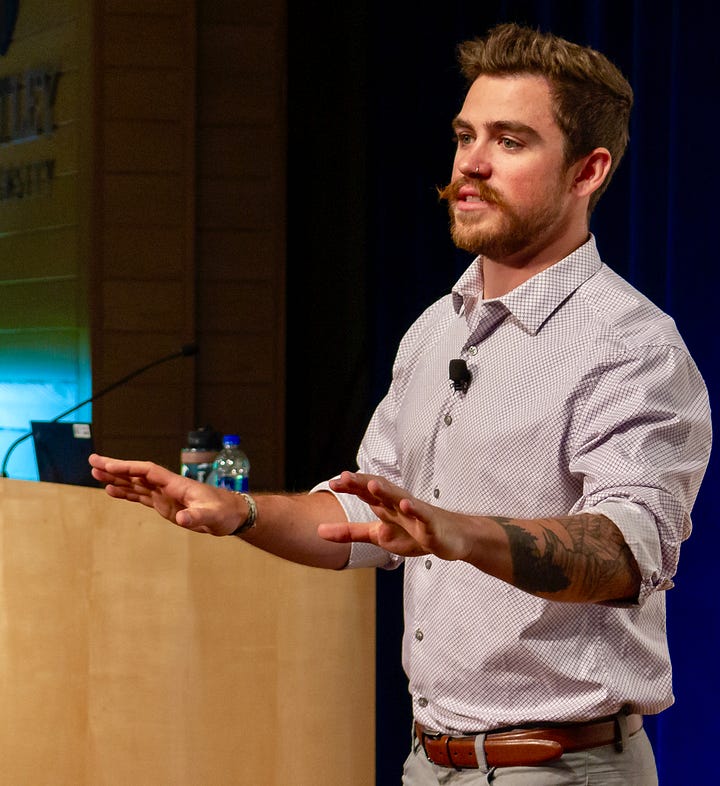
The truth I’m beginning to accept is that I’ve always been more afraid of succeeding than failing.
The trouble with getting good at pretending is that the world starts rewarding the masked version of you, which… ya know… isn’t real and is just a character you made up. This was still happening to me while shifting from outdoor guiding to working in the tech world full-time. New jobs, bigger projects, promotions—all leading toward a path that felt like wearing the wrong suit while running to an uber with no AC at the Atlanta airport on a hot summer day. Umm.. hypothetically, of course.
Fear makes us stand still, especially when we’re not wearing any masks. Which basically turns into rejecting a future version of ourselves that doesn’t exist yet. This looks like not showing up the way you want at all. And that’s how you let masking rob your happiness.
As it turns out, the hardest part of taking my own mask off wasn’t getting over the fear of being seen by other people. That’s what I’d anticipated. But, actually, it was admitting I’d truly forgotten what it was like to be myself without performing.
This kid would be so psyched to know that he finally worked up the courage to use his voice.
If you’re reading this, you’ve noticed that I kicked fear’s ass and started sharing my writing. First off, I’m psyched that anyone reads what I write. That still blows my mind. And, at the same time, it makes me so sad that vulnerability and emotional intelligence are still such taboo topics for dudes. Seriously… behavior doesn’t have a gender. Can we quit it with those silly limits yet?
I’m taking everything I’ve learned about how to be dishonest and using it to show up more authentically. Unmasking for help is the coolest thing you can do.
Especially when it’s in the name of taking back your happiness.
onward.
P.S. If you’re new to my work, I think you’d also enjoy my blog. That’s where you’ll find everything I publish, including my daily email series.
Oh, and Ian, you’ll never see this… but I get it now. Thank you. And holy shit were you wise beyond your years as a college-aged camp counselor.



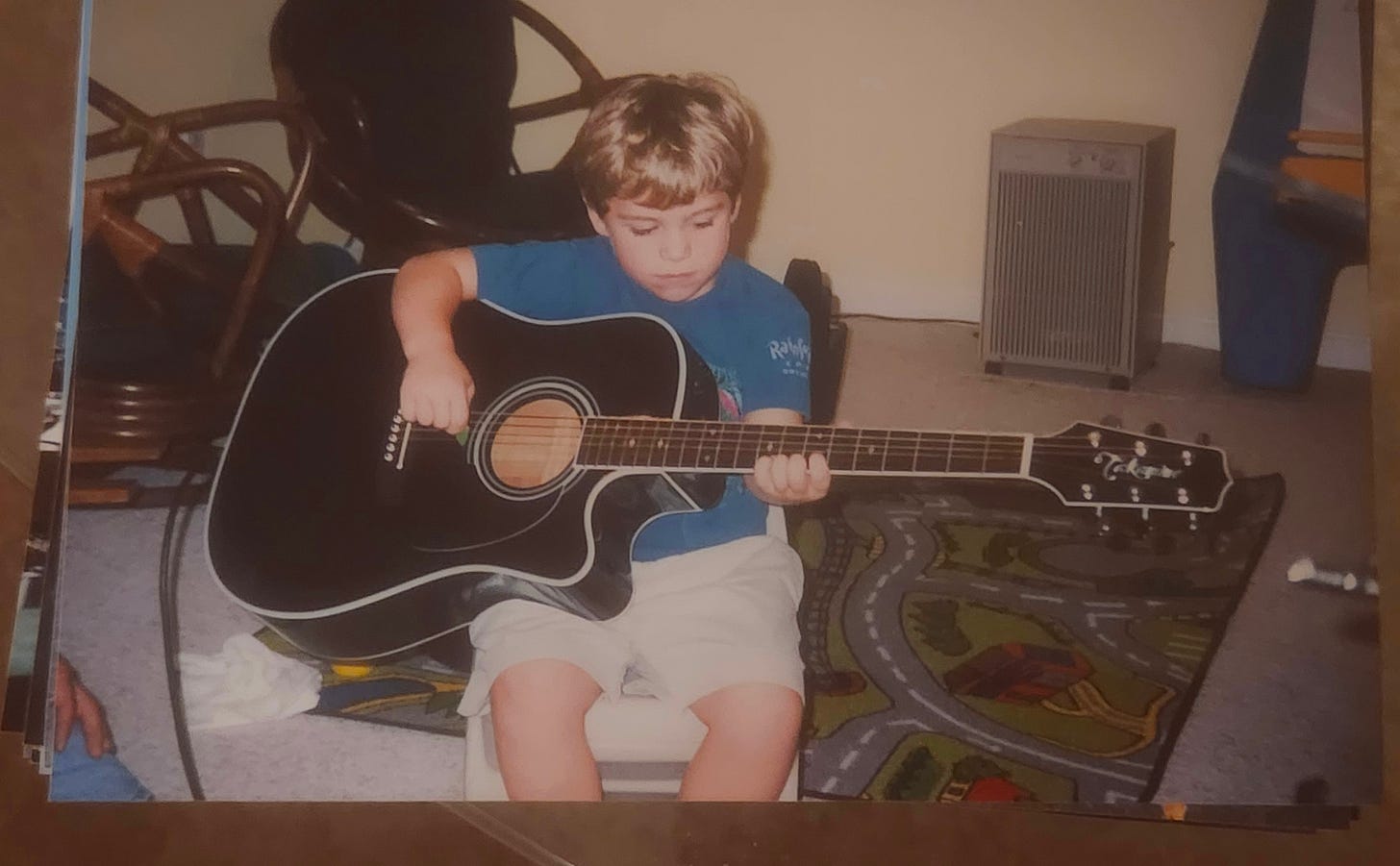
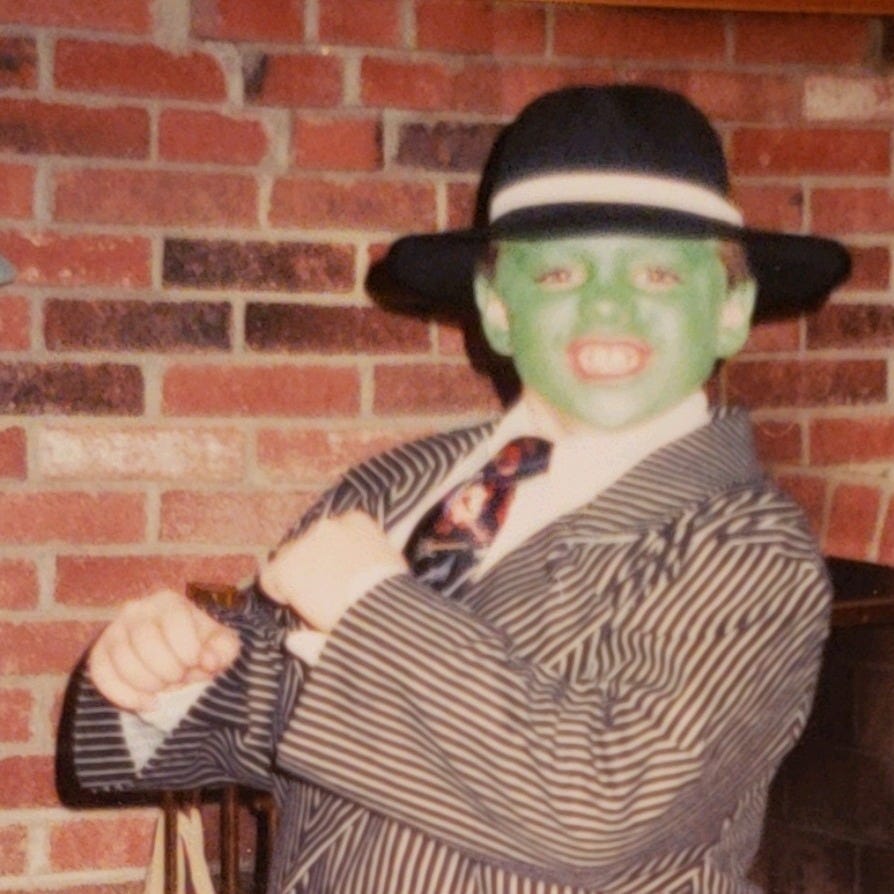
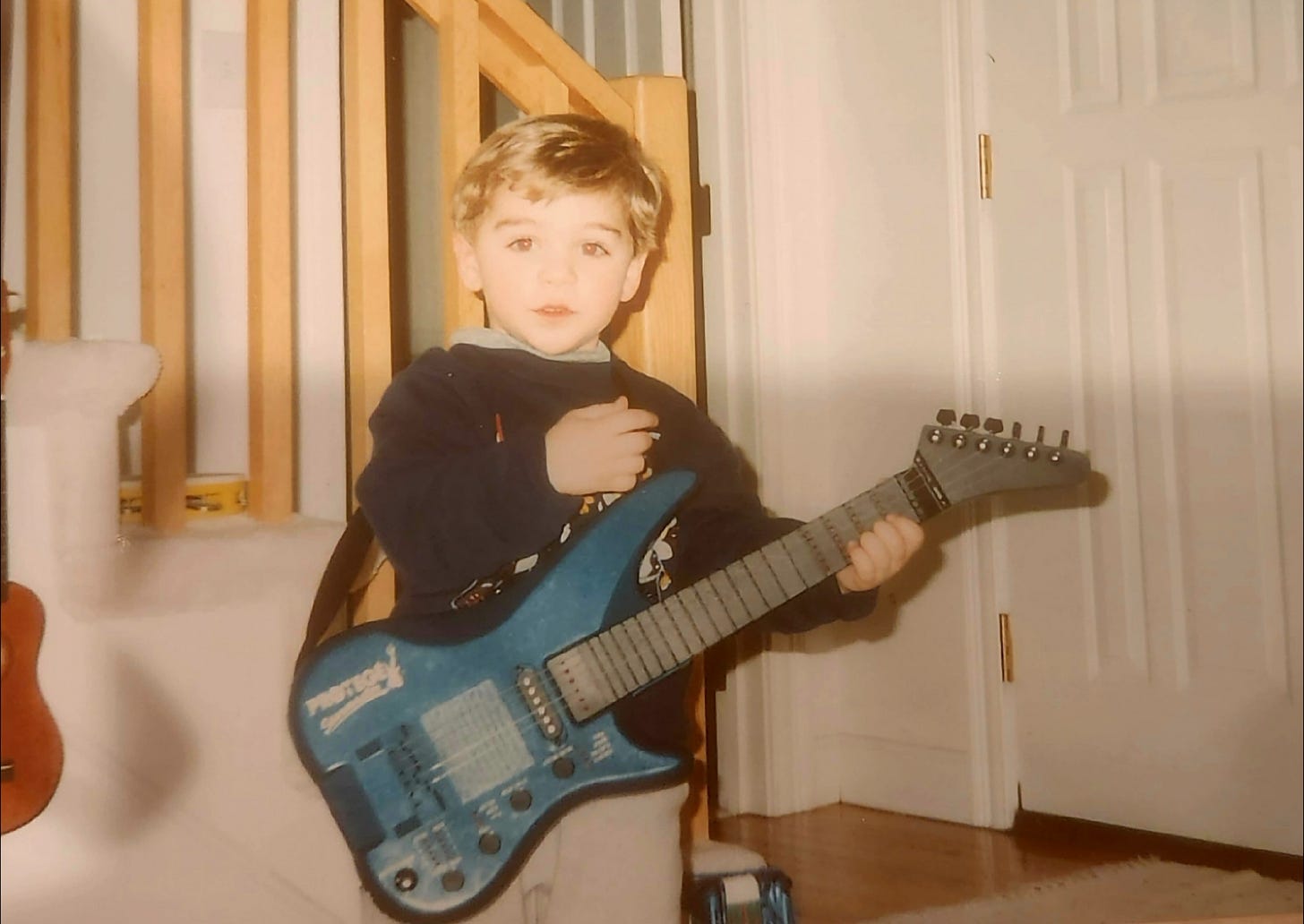

Great post, Derek. We all learn what is acceptable and not acceptable behaviors from our families. It must be a survival instinct for children to try and fit in and please the adults who take care of them.
Your excellent essay reminded me of Dunbar's poem. There's no hint of droning in your writing, D. Each word served its purpose. What a relatable topic. Some masks fit better than others.